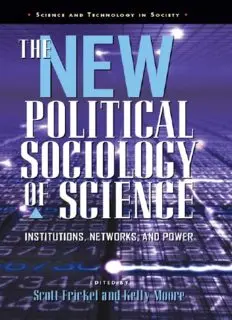
The New Political Sociology of Science PDF
Preview The New Political Sociology of Science
UWP: Frickel & Moore:The New Political Sociology ofScience pagei UWP: Frickel & Moore:The New Political Sociology ofScience pageii Series Editors Daniel Lee Kleinman Jo Handelsman UWP: Frickel & Moore:The New Political Sociology ofScience pageiii The New Political Sociology of Science Institutions, Networks, and Power Edited by and UWP: Frickel & Moore:The New Political Sociology ofScience pageiv The University of Wisconsin Press 1930 Monroe Street Madison, Wisconsin 53711 www.wisc.edu/wisconsinpress/ 3 Henrietta Street London WC2E 8LU, England Copyright © 2006 The Board of Regents of the University of Wisconsin System All rights reserved 1 3 5 4 2 Printed in the United States of America Library of Congress Cataloging-in-Publication Data The new political sociology of science: institutions, networks, and power / edited by Scott Frickel and Kelly Moore. p. cm.—(Science and technology in society) Includes bibliographical references and index. ISBN 0-299-21330-7 (hardcover: alk. paper) 1. Science—Social aspects. I. Frickel, Scott. II. Moore, Kelly. III. Title. IV. Series. Q175.5.N456 2005 306.4´5—dc22 2005008260 UWP: Frickel & Moore:The New Political Sociology ofScience pagev Preface vii Acknowledgments ix 1. Prospects and Challenges for a New Political Sociology of Science 3 and . 2. Contradiction in Convergence: Universities and Industry in the Biotechnology Field 35 . and 3. Commercial Imbroglios: Propriety Science and the Contemporary University 63 - 4. Commercial Restructuring of Collective Resources in Agrofood Systems of Innovation 91 5. Antiangiogenesis Research and the Dynamics of Scientific Fields: Historical and Institutional Perspectives in the Sociology of Science 122 . 6. Nanoscience, Green Chemistry, and the Privileged Position of Science 148 . . 7. When Convention Becomes Contentious: Organizing Science Activism in Genetic Toxicology 185 v UWP: Frickel & Moore:The New Political Sociology ofScience pagevi vi Contents 8. Changing Ecologies: Science and Environmental Politics in Agriculture 215 . 9. Embodied Health Movements: Responses to a “Scientized” World 244 -, , , , , and 10. Strategies for Alternative Science 272 11. Powered by the People: Scientific Authority in Participatory Science 299 . 12. Institutionalizing the New Politics of Difference in U.S. Biomedical Research: Thinking across the Science/State/Society Divides 327 13. Creating Participatory Subjects: Science, Race, and Democracy in a Genomic Age 351 14. On Consensus and Voting in Science: From Asilomar to the National Toxicology Program 378 . 15. Learning to Reflect or Deflect? U.S. Policies and Graduate Programs’ Ethics Training for Life Scientists 405 - 16. Regulatory Shifts, Pharmaceutical Scripts, and the New Consumption Junction: Configuring High-Risk Women in an Era of Chemoprevention 432 Contributors 461 Index 467 UWP: Frickel & Moore:The New Political Sociology ofScience pagevii Many edited volumes begin life as a set of conference papers that get re- vised, edited, bundled together, and presented to readers as an organic product, the outcome of scholarly debate and synthesis. This collection is not one of those. It arose from our conversations with Daniel Klein- man about the structural inequalities flowing from globalization and neoliberal reforms, which appear to have complex and deepening influ- ences across the sciences as well as among producers and consumers of knowledge. From the beginning we conceived the volume as an explicit attempt to infuse sociological and science studies scholarship with anal- yses of science policies and practices, the political and economic deci- sions behind them, and the ecological and social impacts that science continues to create downstream. In doing so, we intended to draw at- tention to questions of power, including why some knowledge doesn’t get made, for example, or why some groups lack ready access to useful knowledge.Toremainbroadlyrelevant,wefirmlybelievethatourschol- arship must attend to the task of explanation. To that end, we invited contributors to tender individual or comparative case study analyses that explain why events and processes in science happen the way they do. All of them complied, most of them happily. Inourintroduction,wespelloutthebasiccontoursofanewpoliti- calsociologyofscience.Indevelopingandorganizingthisframework, wehopetoputintosharperfocusthepoliticalandinstitutionaldynam- icsthatshapethefunding,administration,andpracticeofscience,doing soinawaythatisengagedwithbroadersocialchangeprocessesaswell as central elements of cultural science studies—particularly in its em- phasisonmeaningandnetworks.Contributorstothisvolumearework- ingattheseveryintersections,andcollectivelytheirworkspeakstothe dynamic tensions that accrue from conceptual interaction. A similar dynamismshapedtheevolutionofthisvolumeitself.Coeditingwasan vviiii UWP: Frickel & Moore:The New Political Sociology ofScience pageviii viii Preface intenselycollaborativeprocess,fromearlydiscussionsofourvisionfor thevolume,throughseveraldraftsoftheintroduction,tothefinalediting andindexing.Thereislittleinthisvolumethatdoesnotbeartheimprint ofourcombinedhand,andsoournamesarelistedinalphabeticalorder. In the process of editing this volume, we were pleased to find that demand for critical institutional analyses of science is up, if the two well-attended and lively sessions we organized at the Society for Social Studies of Science conference in November 2003 and the American So- ciological Association conference in August 2004 are any indication. We think they are. The conference sessions provided opportunities for us and for con- tributors to the volume to flesh out the common—and distinct—themes and forms of analysis with each other and the audiences that attended these sessions. UWP: Frickel & Moore:The New Political Sociology ofScience pageix Many people deserve our sincere thanks in pulling this volume together, not least our contributors. We thank them all for their contributions and cooperation in abiding by the fairly strict set of deadlines we imposed on them between the project’s first and final drafts. At the University of Wisconsin Press, series editors Daniel Kleinman and Jo Handelsman and press director Robert Mandel showed enormous faith in this proj- ectfrombeginningtoend.Wehopeitmeetstheirexpectations.Once in production, David Herzberg, Erin Holman, and Matthew Levin shepherded the manuscript onward with skill and care. Jane Curran provided excellent copyediting, and we thank Blythe Woolston for preparing the index. Reviewers Elisabeth S. Clemens and Edward J. Hackett gave us rich and immensely useful commentary. Not least,our lifepartners,RhysWilliamsandBethFussell,listenedpatiently and read drafts when they had more pressing things to do. We thank them for their love and support. ix
